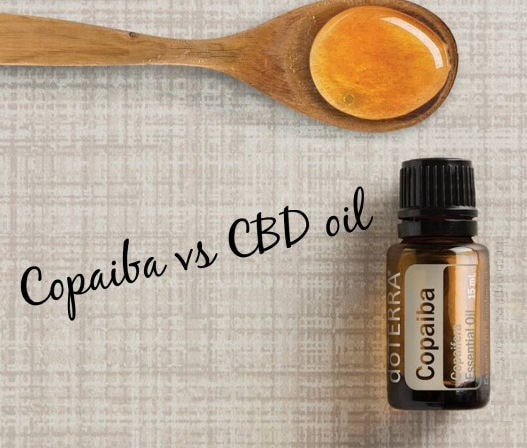|
By Rachel dōTERRA Wellness Advocate
DōTERRA added Copaiba essential oil last fall and we are EXCITED to have this oil in our arsenal because it is powerful for our brains and nervous systems. I’m excited to share more about this oil with you. CBD oil has been a hot topic lately as an alternative to drugs. There are a lot of questions about CBD vs Copaiba oil so I will break down the differences in an easy-to-understand way. There’s also a lot of controversy, and even more opinions, these days about medical marijuana, CBD oil and products that contain THC so let’s start with some definitions…. Cannabinoids: Any chemical compound that affects one or both cannabinoid receptors in the human body, CB1 or CB2. Some cannabinoids are legal (CBD and those found in essential oils) and some, like THC from cannabis/marijuana, are not … Here are 3 types of Cannabinoids: CBD: CBD, or CannaBiDiol, is a naturally occurring component of the cannabis and hemp plants. CBD made from hemp has a low concentration around 2-4%. If derived from cannabis/marijuana CBD has a higher concentration around 5-30%. All CBD extractions contain some amount of THC (the part of the plant that makes you feel high) though some are low enough to be legal in our country. CBD is often said to be legal in all 50 states but that is controversial. Benefits include pain relief, reduces anxiety, effective against cancer, treats seizures and other neurological issues, prevention of diabetes through lower insulin levels and promotes cardiovascular health. This is the power of cannabinoids! THC: THC, or TetraHydroCannabinol, is also a naturally occurring compound in the cannabis plant. This is the part of the plant that makes people feel high when they smoke marijuana or use products that contain THC. Supplements that contain THC are only legal in a few states. THC resembles another cannabinoid naturally produced in our brains, anandamide, which regulates our mood, sleep, memory, and appetite. Hence the reason THC makes you relaxed … and hungry. BCP: BCP, or Beta-CaryoPhyllene, is the dietary cannabinoid found in dōTERRA's Copaiba oil. Not only is it in Copaiba essential oil it’s in dōTERRA's in very high amounts – 60%!!! While this is a different type of cannabinoid than CBD it directly affects the same CB2 receptors in amazing ways and is present in a much higher amount. It’s also found in lower levels in other essential oils, in lower amounts, like Black Pepper and Melissa. What are cannabinoid receptors? We all have cannabinoid receptors in our bodies and they are super important. They are found all over the body, in the brain, organs, tissues, glands and immune cells. In each tissue, the cannabinoid system performs different tasks, but the goal is always the same: homeostasis. We have two different types of receptors – CB1 and CB2. CB1, predominantly present in the nervous system, connective tissues, gonads, glands, and organs; and CB2, predominantly found in the immune system and its associated structures. Many tissues contain both CB1 and CB2 receptors, each linked to a different action. (source) The CB1 receptors are the ones that THC interacts with and causes psychotropic effects. The CB2 receptors are the ones that do not make you “high” when affected. These are the target when using CBD oil and Copaiba essential oil. CBD actually indirectly interacts with CB2 receptors while the main constituent of Copaiba interacts directly. CB2 receptors are found mostly in the immune system, and they seem to reduce inflammation and certain kinds of pain. So to summarize CBD vs Copaiba oil ….. THC comes from the cannabis or hemp plants. It is completely illegal in about half the US and legal for at least medical purposes in the other half. CBD oil from hemp contains only trace amounts of THC and is legal in all 50 states. It does not make you high but it does help with neurological issues, pain and more by indirectly interacting with CB2 receptors in the body. BCP, caryophyllene, is a cannabinoid found in very high levels in dōTERRA's Copaiba and it interacts DIRECTLY with CB2 receptors. When taken internally, the BCP in Copaiba possesses strong antioxidant properties, promotes healthy cellular function, may help support immune function while supporting overall circulatory health, and may help support the health of the gastrointestinal tract and colon. Additional research has shown that Copaiba essential oil (with all its constituents) may help keep the mouth, teeth, and gums clean and healthy looking. Topically applied Copaiba oil may also help keep the skin clean and clear while helping to reduce the appearance of blemishes. Another interesting experimental research study found that Copaiba taken internally may help to support uterine health and ease menstruation.* *These statements have not been evaluated by the Food and Drug Administration. This product is not intended to diagnose, treat, cure, or prevent any disease.
0 Comments
|
Blog CreatorMary DeRoche Archives
April 2024
Categories
All
|
DISCLAIMER: I, Mary DeRoche, am not a veterinarian and do not practice medicine. I do not diagnose, cure, heal, treat disease or otherwise prescribe medication. I assist people in working with their animals in correcting energetic imbalances in their pet’s bio-field that assists the body to release its innate healing ability. When the energy chi of the body is balanced and moving correctly, the body’s innate natural energy heals itself. All healing is self-healing. Animals are affected by their environment so I also include the pet parents in my work. Animals do pick up energy from their family and environment. I only recommend the use of therapeutic grade essential oils for your pets because therapeutic grade essential oils have been tested to guarantee that they are free of synthetics, additives, toxins and any other impurities, which can result in side effects and/or inconsistent results. Essential oils and supplements are recommendations to help boost the pet’s immune system.
I recommend that clients continue to see their pet’s regular veterinarian and follow their advice and my work is a complement to regular allopathic medicine. My spiritual energy work is not a substitute for conventional medical diagnosis or treatment for any medical or psychological condition. For such issues, you should seek the proper licensed veterinarian. I am a Healing Touch for Animals Practitioner and a Subtle Energy Practitioner and my work is spiritually and energetically based and I believe all healing is spiritual in nature. I do not make any promises, warranties or guarantees about results of my work, or of the energy sessions. The energy sessions help many animals but like any energy work, it might not work for everyone. The use of essential oils, herbs and supplements is to assist the pet with balancing chakra centers for proper energy flow or chi.
© 2013~2023 Pawsitive Wellness Center All Rights Reserved.
I recommend that clients continue to see their pet’s regular veterinarian and follow their advice and my work is a complement to regular allopathic medicine. My spiritual energy work is not a substitute for conventional medical diagnosis or treatment for any medical or psychological condition. For such issues, you should seek the proper licensed veterinarian. I am a Healing Touch for Animals Practitioner and a Subtle Energy Practitioner and my work is spiritually and energetically based and I believe all healing is spiritual in nature. I do not make any promises, warranties or guarantees about results of my work, or of the energy sessions. The energy sessions help many animals but like any energy work, it might not work for everyone. The use of essential oils, herbs and supplements is to assist the pet with balancing chakra centers for proper energy flow or chi.
© 2013~2023 Pawsitive Wellness Center All Rights Reserved.


 RSS Feed
RSS Feed